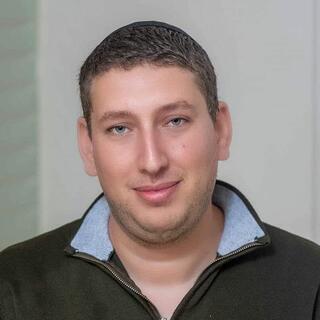Getting your Trinity Audio player ready...
Shulem Lemmer, known by the stage name Shulem, is one of the hottest names in recent years in the Hasidic singer circuit in Israel and the United States. His new performance of the song "October Rain," the original version of the song "Hurricane" by Eden Golan which finished in fifth place at Eurovision, swept many away - both due to his special voice and exciting performance, and his unusual music video.
The clip shows him, a man in Hasidic clothing with a yellow hostages pin, filmed in the heart of the memorial site where the Nova festival was held and where hundreds of revelers were murdered on October 7. Among the photos of those massacred and Israeli flags he sings a song in memory of them.
Lemmer, a Belz Hasid and a resident of New Jersey, has released three albums to date, including mainly songs derived from prayers and Biblical sources, which have become commonplace in the mouths of fans of the genre - but he does not stop at Hasidic chants and music.
"I started singing in choirs from a young age, sometimes I sang solo, and here and there I would also perform as a cantor in the synagogue," he says. "My brother is a cantor and my late father raised us to sing a lot at home, so I got to know this world very well. Alongside this, we always listened to 'normal' music at home, and I immediately connected to these two worlds."
His name is Shalom (full disclosure - after the name of a great-great-grandfather shared by him and this reporter) and he is a member of an American Hasidic family, but speaks fluent Hebrew as a result of his studies in yeshivas in Israel - Belza in Bnei Brak and Mir in Jerusalem. About a year ago he broke the boundaries of the ultra-Orthodox audience with his own performance of the song "Blind Bat" by Hanan Ben Ari. In fluent Hebrew mixed with a bit of a Yiddish accent, Shulem in the clip is seen performing the song of the well-known Israeli singer.
"I come to Israel from time to time for concerts; two months ago I was at a big concert in Caesarea for MDA volunteers and I have come on other occasions. I saw that people are starting to get to know me," he says. "I feel that many people connect through music, even if they are not religious."
Ultra-Orthodox singers mostly sing songs from Jewish sources, prayers or words from the Torah, but his performance of the Eurovision song surprised many. But the connection is rather natural.
"Music is music, it's a language of the heart," he says, adding that "if there is nothing problematic or immodest in the song then I can sing it. Why not. I consult with the rabbis before I perform a song. It is important that people see that we have much more in common than it seems, even if I am religious and someone else is not. We are one people, even if we are different people, music is an excellent bridge between people.
In general, Lemmer's boundaries are very wide. He even appeared at major sporting events in the United States and was chosen to sing the American national anthem at NBA and MLB basketball and baseball games.
At the time of the October 7 Hamas attack Lamer was in Israel. "On Simchat Torah we were in Jerusalem. We saw hundreds of soldiers saying goodbye to their parents and we realized something serious was happening here," he recalled. "We started singing 'Acheinu Kol Beit Yisrael' (a Jewish prayer about the unity of the Jewish people); We sang to the soldiers before they got on the bus, we prayed for them, we cried. We understood that something was happening. Later on I also went to sing for the soldiers. Since then it stuck with me, I wanted to take the feeling I had and convey it in a song. This song It really fit."
Lemmer presents "October Rain," whose lyrics were written by Avi Ohayon and Keren Peles, as a song that in his eyes is close to a prayer.
3 View gallery


Eden Golan was supposed to perform 'October Rain' at Eurovision, but it was disqualified for being too political
(Photo: Motti Kimchi)
On Wednesday, Ynet reported that Eden Golan will perform the song at the main ceremony of the State of Israel and the Ministry of Foreign Affairs at the United Nations on October 7. Following claims from the European Broadcasting Union that the original song contains "political statements" that are prohibited according to the competition's regulations, some of the song's lyrics were been replaced and its name was changed to "Hurricane" - the song that eventually represented Israel at the Eurovision Song Contest in Malmö.
"I've had hundreds of messages on Facebook and Instagram telling me: 'You must cover this song,' since it came out. After I was here on Simchat Torah and we experienced the painful day here with all the people of Israel, I went to the area where the Nova festival was held, and I felt that it was suitable for the music video," according to Lemmer.
Eden Golan sings 'October Rain' in Hostages Square
(Video: Satview)
Lemmer says there is no discord between being a Belz Hasid and wearing a yellow hostages pin while waving a flag of Israel.
"The entire nation of Israel prays for the hostges; There is no one who does not pray for the hostages, the soldiers and the injured. Even if there are communities that do not support the state because of their view, I do not believe there is anyone who does not want the best for the hostages. We, the followers of Belza are very involved and feel a part of it."







